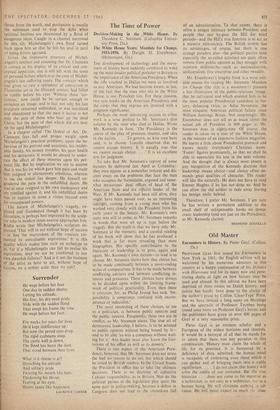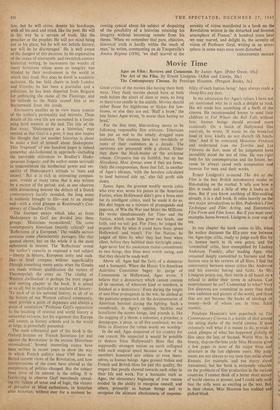Old Master
Encounters in History. By Pieter Geyl. (Collins, 35s.)
PROFESSOR GEYL first issued his Encounters in New York in 1961; the English edition will be welcomed by his numerous admirers in this country as a happy continuation of his Debates with Historians and for its many new and pene- trating shafts of light on how history may be used and abused. In this edition we have been deprived of three essays on Dutch history, and justice has hardly been done to the clarity of the author's prose by Collins 'Clear-Type' Press. But we have instead a long essay on Huizinga and the spectacle of Professor Toynbee being tossed once more on Professor Geyl's horns; and the publishers have given us over 400 pages of Geyl at a very reasonable price.
Pieter Geyl is an eminent scholar and a European of the widest horizons and interests. It would be a betrayal of all that he stands for to admit that there was any paradox in this combination. 'History must claim the whole of life for its province. It is hampered by a deficiency of data, admitted; the human mind is incapable of embracing even those which it can gather and of bringing them into a stable equilibrium. . . . 1 do not ,claim that history will solve the riddle of our existence. But the true historian . . does not come to his material as a technician, or not only as a technician, but as a human being. He will eliminate nothing in ad- vance. He will never expect to reach the abso- lute, but he will strive, despite his handicaps, with all his soul and mind, like the poet. He will in his way be a servant of truth, like the preacher or the prophet. He will not mind being put in his place, but he will not belittle history, nor will he be discouraged.' He is well aware of the dangers of this doctrine. In his exploration of the ocean of nineteenth- and twentieth-century historical writing, he encounters the wrecks of many historians whose sense or integrity was blinded by their involvement in the world in which they lived. Nor does he dwell in academic seclusion. He has held chairs in both London and Utrecht; he has been a journalist and a politician; he has been deported from Belgium for embracing the cause of the Flemings; and his attitude to the Nazis caused him to see Buchenwald from the inside.
Encounters enables us to view many aspects of the author's personality and interests. These details of his own life are recounted in a fascin- ating brief memoir at the end. The title of the first. essay, 'Shakespeare as a historian,' may remind us that Geyl is a poet; it may also inspire the thought that yet another historian is about to make a fool of himself about Shakespeare. This 'fragment' of one hundred pages is indeed somewhat old-fashioned in approach—including the inevitable references to Bradley's Shake- spearean Tragedy: and the author seems seriously to underestimate the intellectual power and ver- satility of Shakespeare's attitude to 'state and society.' But it is rich in interesting compari- sons, reveals at many turns that it was written by a master of the period; and, as one observes with diminishing interest the defects of a Dutch contemporary lucidly revealed, the long essay is suddenly brought to life—and to an abrupt end—with a vivid glimpse at Rembrandt's Con- spiracy of Claudius Civilis.
The fourteen essays which take us from Shakespeare to Geyl are divided into three groups: 'Historians reconsidered,' On some contemporary historians (mainly critical)' and 'Reflections of a European.' The middle section contains some characteristic passages, like that quoted above; but on the whole it is the most ephemeral in interest. The 'Reflections' reveal the author's capacity to expound a vast subject —liberty in history, European unity and such- like—in brief compass without superficiality (though something seems amiss when the Greeks are made without qualification the victors of Thermopylx); the essay on 'The vitality of Western civilisation' is perhaps the most urgent and moving chapter in the book. It is aimed at us all; but in particular at teachers of history: `To each of us his national history, to all of us the history of our Western cultural community, must provide a point of departure and always a point of orientation.' Professor Geyl's opposition to the teaching of oriental and world history is somewhat extreme, but his argument that Europe still counts, in history schools and in the world at large, is powerfully presented.
The most substantial part of the book is the Oxford lectures on 'French historians for and against the Revolution' in the section 'Historians reconsidered.' Several interesting essays have been written in recent years to show the way in which French politics since 1789 have re- flected current views of the Revolution, and how interpretations of the event have altered as the complexion of politics changed. But the subject loses none of its interest in the telling. It is faseirriung to observe Geyl mercilessly reveal- ing the failure of sense and of logic, the victory of pre:Lidice or blind enthusiasm, in historian after historian, without ever for a moment be-
coming cynical about his subject or despairing of the possibility of a historian retaining his integrity without becoming remote from his theme. 'When we remember that pure, objective, historical truth is hardly within the reach of man,' he writes, commenting on de Tocqueville's Ancien Regime (1856), 'we shall marvel at the serenity of vision manifested in a book on the Revolution written in the disturbed and feverish atmosphere of France.' A hundred years later we may marvel, and delight in, the serenity of vision of Professor Geyl, writing in an atmo- sphere in some ways even more disturbed.
CHRISTOPHER BROOKE































 Previous page
Previous page